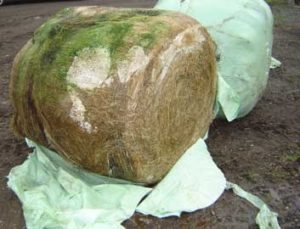Post Opening Deterioration (POD) In Silage
23 August 2017 POD is the term used to describe the wastage which can occur when made silage is exposed to air/oxygen. It is caused by the rapid growth of microbes (principally yeasts and moulds) in the silage and one side effect is that the silage begins to heat. POD can occur when the wrap on baled silage is punctured; the wrap opens when the bale settles; on the face as soon as the silage pit is opened and in the trough when silage is fed out. The bigger the area and the longer it is exposed the greater the loss.
POD is the term used to describe the wastage which can occur when made silage is exposed to air/oxygen. It is caused by the rapid growth of microbes (principally yeasts and moulds) in the silage and one side effect is that the silage begins to heat. POD can occur when the wrap on baled silage is punctured; the wrap opens when the bale settles; on the face as soon as the silage pit is opened and in the trough when silage is fed out. The bigger the area and the longer it is exposed the greater the loss.
The microbes responsible for POD feed on the soluble nutrients in the silage which are also the most valuable to our livestock. As a result the impact is “invisible” to the naked eye and can only be detected by the rise in temperature.
The Importance of POD
POD has several negative effects on the feed value of silage –
- Silage DM is “burnt off” and the money invested in producing it is wasted.
- The loss of silage DM means that either more silage has to be made or forage purchased.
- The loss of soluble nutrients in the silage reduces its feed value and the amount animals can eat. This results in reduced performance or requires additional concentrates if performance is to be maintained.
Perversely, better quality silage is more likely to be at risk of POD due to the greater concentration of high quality, soluble nutrients.
How To Avoid/Minimise POD?
The most important points are to pack silage as tightly as possible and to keep it air tight for as long as possible i.e. in well-sealed pits and bales. When pits are opened keep the face as tight as possible to minimise the entrance of air. When feeding out, try and ensure silage is cleaned up ASAP.
Another approach is to use additives designed to prevent POD. Hopefully we will be trialling one of these on baled silage later this summer.
Basil Lowman, basil.lowman@sac.co.uk
Sign up to the FAS newsletter
Receive updates on news, events and publications from Scotland’s Farm Advisory Service
